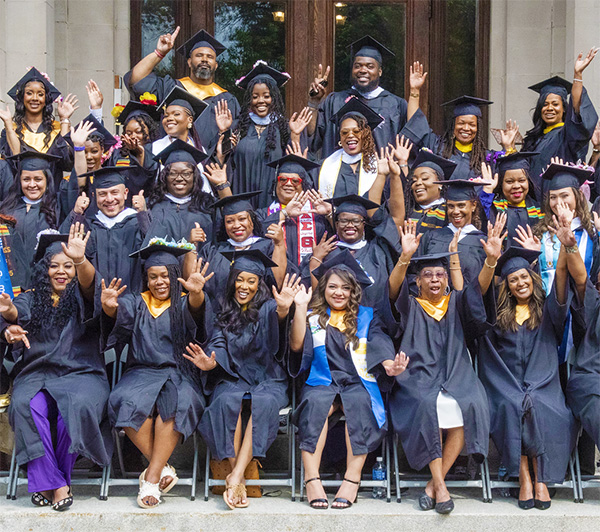Annual, Reunion, and Student Giving—The Heart and Soul of Philanthropy at Trinity
Individual giving, from loyal alumnae and alumni, appreciative students, and members of the community committed to Trinity’s mission, provides vital resources to support our students, faculty, and programs.

Unrestricted Annual Fund Giving
The Trinity Annual Fund is the cornerstone of all giving to the university. Every gift to the Annual Fund makes a difference! Last year, over 1000 donors supported the Trinity Annual Fund, totaling over $1 million in total unrestricted support – the majority of which went directly to our amazing students and outstanding faculty. It’s all about participation at Trinity, so no matter the size of your gift, please know it does make a difference!
All gifts to the Annual Fund provide essential on-going support for scholarships, student tuition emergency funds, faculty support and curriculum development, technology, library resources, and many other critical needs. The importance of unrestricted annual support cannot be overstated – with the vast majority of funds being used to support teaching and learning and directly impacting our worthy students and exemplary faculty through:
- Scholarships: for talented students who deserve access to excellence and opportunities to excel in life.
- Student Tuition Emergency Funds: to assist students needing extra support in meeting tuition requirements and to help reduce debt loads and ensure degree completion.
- Instructional Support: for Trinity’s faculty, library, academic programs, equipment and educational technology.
- Student Services: for Campus Ministry, athletic programs and equipment, a wide variety of cultural and extra-curricular activities, and other vital aspects of campus life.
For questions regarding the Trinity Annual Fund, please contact the Development Office at 202-884-9720 or by email at development@trinitydc.edu.
Reunion and Class Giving
Reunion and Class Giving have a long and storied tradition at Trinity. Reunion and class giving is especially robust among 50th reunion classes, inspiring class fund projects benefiting myriad institutional funding priorities over the decades. Recent class fund initiatives have benefitted:
- Student Emergency Funds – with the Class of 1969 generating over $420,000 to help bridge the financial gap for juniors and rising seniors to off-set debt and support their persistence through graduation.
- Nursing and Health Professions – with the Class of 1970 raising over $250,000 for aspiring nurses and health care professionals at Trinity (and helping to ensure our track record of 100% pass rate for NCLEX licensure among our nursing graduates!).
- Environmental Justice and STEM Scholarships – with the Class of 1971 raising upward of $610,000 (and counting) to support the environmental justice curriculum and provide STEM scholarships.
- Sister Margaret Claydon Scholarship – with the Class of 1963 inspiring initial contributions to establish the fund for their 50th reunion and on-going support totaling over $500,000 in expendable scholarship money for our excellent students.
- The Mary Christian “Boodie” Clark ‘67/Sister Lidwin Fund – with the Class of 1967 totaling more than $150,000 to support unrestricted scholarships at Trinity.
Celebrating a reunion or organizing a class gift is a meaningful way to bring classmates together to express gratitude for Trinity. For questions regarding reunion and/or class gift projects, please contact the Alumnae/i Office at alumnae@trinitydc.edu or 202-884-9700.
Student Giving
The Help a Sister Out Fund, founded by the Class of 2022 to create stability for various Trinity women’s academic journey in the College of Arts and Sciences was created with this mission:
Money shouldn’t be a limitation in obtaining a higher education. By contributing, you are helping students realize their college dreams. Join us in helping students from diverse backgrounds ease into their college journey. Our fund helps students from all backgrounds obtain financial resources to alleviate food insecurity and provide for course-related materials, transportation, and medical expenses.